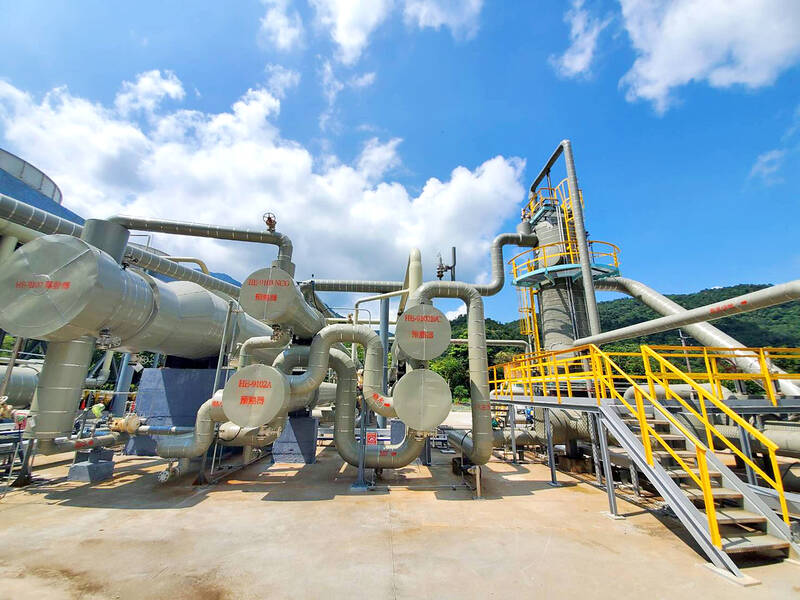The operators of Taiwan’s first privately run megawatt-level geothermal power plant in Yilan County have revealed that the site has produced more than 38 million kilowatt-hours (kWh) of electricity since opening in October 2021.
Staff at the 4.2MW Cingshuei Geothermal Power Plant shared the information during a visit by Minister Without Portfolio Wu Tze-cheng (吳澤成) and Yilan County Commissioner Lin Zi-miao (林姿妙) on Friday.
The development of the geothermal power plant in Datong Township (大同) was contracted to Yi Yuan Co (宜元股份), a joint venture of Fabulous Power Co (結元能源開發) and Taiwan Cogeneration Corp (台灣汽電共生), on a build-and-operate, and rehabilitate-operate-transfer model, when Wu was acting Yilan County commissioner in 2017.

Photo courtesy of Yilan County Government via CNA
The power plant then began operations October 2021 during Lin’s term and has produced 38 million kWh of power as of the end of July, its operators said.
The construction began in 2017 with an initial investment of NT$765 million (US$23,90 million), and the power plant was completed in September 2021 before securing a license from the Bureau of Energy a month later.
The plant has adopted “binary-cycle generators” that cause less damage to turbines and less precipitation of solids. the Yilan County government said.
The 38.25 million kWh generated can meet the demand of about three-quarters of the combined households in Datong Township and the neighboring Sanshing Township (三星), the county government said.
The two townships consist of about 10,000 small households.
When Wu, who concurrently serves as head of the Executive Yuan’s Public Construction Commission, inquired whether the accumulation of solid substances — commonly known as “fouling” — could possibly again affect the plant’s operations, he was assured by Yi Yuan Co that the new generator units have been efficient and so far the fouling rate has been better than before.
Touting the power plant as a crucial energy provider for Yilan County and a milestone for Taiwan’s effort to achieve sustainable development, Lin said she is expecting to continue local-central collaboration on power generation in the future.

When an apartment comes up for rent in Germany’s big cities, hundreds of prospective tenants often queue down the street to view it, but the acute shortage of affordable housing is getting scant attention ahead of today’s snap general election. “Housing is one of the main problems for people, but nobody talks about it, nobody takes it seriously,” said Andreas Ibel, president of Build Europe, an association representing housing developers. Migration and the sluggish economy top the list of voters’ concerns, but analysts say housing policy fails to break through as returns on investment take time to register, making the

NOT TO WORRY: Some people are concerned funds might continue moving out of the country, but the central bank said financial account outflows are not unusual in Taiwan Taiwan’s outbound investments hit a new high last year due to investments made by contract chipmaker Taiwan Semiconductor Manufacturing Co (TSMC, 台積電) and other major manufacturers to boost global expansion, the central bank said on Thursday. The net increase in outbound investments last year reached a record US$21.05 billion, while the net increase in outbound investments by Taiwanese residents reached a record US$31.98 billion, central bank data showed. Chen Fei-wen (陳斐紋), deputy director of the central bank’s Department of Economic Research, said the increase was largely due to TSMC’s efforts to expand production in the US and Japan. Investments by Vanguard International

WARNING SHOT: The US president has threatened to impose 25 percent tariffs on all imported vehicles, and similar or higher duties on pharmaceuticals and semiconductors US President Donald Trump on Wednesday suggested that a trade deal with China was “possible” — a key target in the US leader’s tariffs policy. The US in 2020 had already agreed to “a great trade deal with China” and a new deal was “possible,” Trump said. Trump said he expected Chinese President Xi Jinping (習近平) to visit the US, without giving a timeline for his trip. Trump also said that he was talking to China about TikTok, as the US seeks to broker a sale of the popular app owned by Chinese firm ByteDance Ltd (字節跳動). Trump last week said that he had

STRUGGLING TO SURVIVE: The group is proposing a consortium of investors, with Tesla as the largest backer, and possibly a minority investment by Hon Hai Precision Nissan Motor Co shares jumped after the Financial Times reported that a high-level Japanese group has drawn up plans to seek investment from Elon Musk’s Tesla Inc to aid the struggling automaker. The group believes the electric vehicle (EV) maker is interested in acquiring Nissan’s plants in the US, the newspaper reported, citing people it did not identify. The proposal envisions a consortium of investors, with Tesla as the largest backer, but also includes the possibility of a minority investment by Hon Hai Precision Industry Co (鴻海精密) to prevent a full takeover by the Apple supplier, the report said. The group is